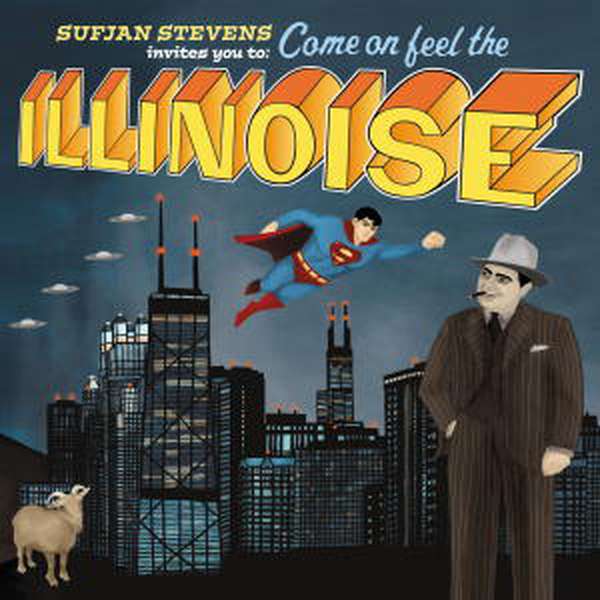What is the sign of a "great" record? What defines a classic? Is it a cult following? Musical virtuosity? Ambition and drive? Three chords and the truth? All these questions will be answered within this review. Maybe.
If you're still unaware of the young and illustrious Sufjan Stevens, you're either a My Chemical Romance fan who's still not discovered "the scene" yet (although you think you have), or a bitter old punk who would be scared away from such a record with a single mention of the words "banjo" or "religious." For those of you still with me, let's proceed. In brief, Mr. Stevens has taken it upon himself to begin the "50 States Project" - an album-by-album tour of all of the states in the union. Here we are with Illinois, the second installment in the project.
Comprising 74 minutes (or, 22 tracks), Stevens has a lot to say; which is also evident in his song titles (for example, Track 2: "The Black Hawk War, or, How to Demolish an Entire Civilization and Still Feel Good About Yourself in the Morning, or, We Apologize for the Inconvenience But You're Going to Have to Leave Now, or, 'I have fought the Big Knives and will continue to fight them until they are off our lands!'"). As already detailed in his first venture, Greetings From Michigan: The Great Lakes State , Stevens shows a surprising level of knowledge regarding his chosen state, weaving lyrics involving state legends, famous citizens, landmarks and concepts around rambling banjos, a joyful wind orchestra, and wide-ranging set of vocalists. With so much going on, it's fairly safe to say that there's something here to appeal to everyone.
The record really kicks off on the third track, "Come on! Feel the Illinoise!," with an infectious piano/bass line and catchy rhythms. Stevens' talent for arrangement is shown here as the various parts of the song evolve and conclude around one another. The atmosphere is quickly changed with the next track, "John Wayne Gacy, Jr"., a sober and subdued ballad. As well as the astonishing range of musical instruments under his belt (not literally; I'd imagine several banjos and recorders would be uncomfortable, not to mention the church organ), Stevens' vocals are haunting and soothing, with some heartfelt lyrics to top it off.
As the record progresses it really feels like Stevens has taken you on a journey around Illinois, introducing you to its stories and people. With a personal edge leaking into the lyrics, the album has a warmth to it that many of Stevens' peers have lost, with their vapid sloganeering and empty sound bites. Despite Sufjan not bringing the rock as such (the closest we get is some distortion on "The Man of Metropolis Steals Our Hearts"), this record keeps your attention and forces you to listen if you're trying to use it as background ambience.
There's only so much I can say about this record in mere words. Once you listen to Sufjan Stevens you'll find yourself humming the infectious melodies, tapping out the rhythms, and unconsciously absorbing useless pieces of information about Illinois, quite without realizing it, and you can't say that for The Mars Volta, unless your daily conversation involves ecto-mimed bisons and mink handjobs. This is a record you could put on for your parents and still enjoy without feeling the guilty burn of dad-rock. Look, enough beating about the bush. This record will improve your life. You will become 25% more appealing to the opposite sex (or hey, the same sex if that's your thing) if you buy it; SPB guarantees it.* Buy this album.
*Not a guarantee.



